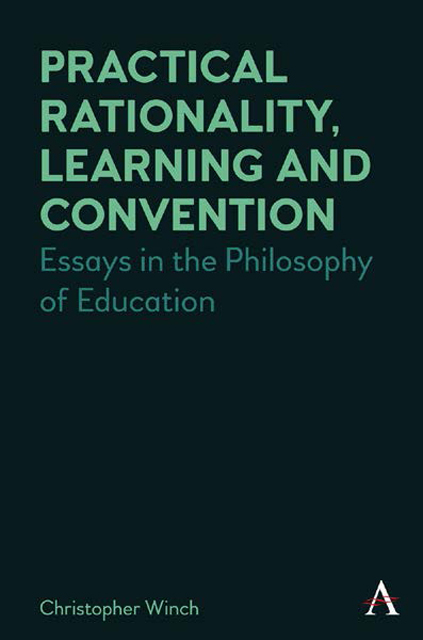Chapter Five - Ryle on Knowing How and the Possibility of Vocational Education
Published online by Cambridge University Press: 09 December 2022
Summary
Vocational education in Britain is usually regarded as skill training, in which ability to perform specific actions related to narrowly-defined tasks is the desired outcome. Indeed, the term ‘training’ is more commonly used than ‘vocational education’. There has been an increasing tendency for designers of vocational qualifications to regard the possession of knowledge as generally irrelevant to practice. Gilbert Ryle's distinction between knowing how and knowing that seems particularly apt to this outlook, and the overall thrust of Ryle's arguments, as well as the rhetorical tone in which he develops his case, suggest that a narrowly skill-based training model should underpin vocational education and training. Ryle's account of what it is to do something seems at times uncannily like the philosophy underlying performance-based vocational qualifications articulated by Gilbert Jessup, one of the architects of the National Vocational Qualification (NVQ) framework: ‘Skills can only be demonstrated through their application in performance (doing something) while knowledge can be elicited through the more abstract means of conversation, questioning or talking.’
Ryle establishes his distinction in a way prone to a misreading along the lines of Jessup's views. His contrast between the performance of the novice and the expert practitioner, for example, tends to oversimplify the differences between the two. Ryle also tends to disparage the role of propositional knowledge in expert practice without completely dismissing it, nevertheless leaving the reader in little doubt that he thinks that it is of minor importance. However, this is not the only way to interpret Ryle's distinction, and I will show that it can be used to underpin a concept of vocational education rather than training.
Ryle appears to think that his arguments against the claim that knowledge how is a species of knowledge that preclude knowledge of theories, propositions and norms from playing a significant role in action. However, there are many cases where we act on the basis of knowledge of theories, norms and propositions. Furthermore, this assumption is fundamental to many kinds of professional and occupational activity, and if undermined, leaves us bereft of an adequate understanding of what constitutes action in professional and occupational contexts, how to evaluate it and how to prepare someone for it. Failure to make this assumption undermines forms of vocational education and assessment that presuppose underpinning knowledge and principles.
Information
- Type
- Chapter
- Information
- Practical Rationality, Learning and ConventionEssays in the Philosophy of Education, pp. 55 - 70Publisher: Anthem PressPrint publication year: 2022
